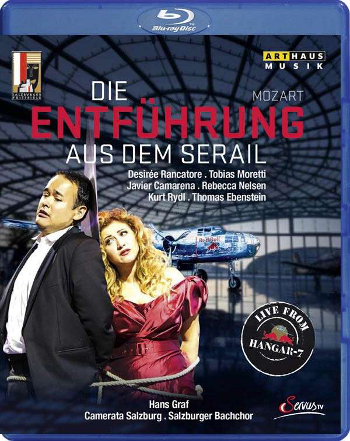Bassa Selim is a
Valentino-like dress designer (“BASSA” reads the license plate on his Jeep,
and his logo, “BS,” resembles the signature of a sultan). Konstanze is a
supermodel (übermodel?) lured from her lover, Belmonte. Blondchen is
one of the many seamstresses we see at their machines, working on the new
collection. Osmin is a power-lifting major d’omo. Pedrillo works in IT. The
entire production was staged for telecast in Hangar-7 of the Salzburg Airport,
otherwise a museum for classic Formula 1 race cars and fancy airplanes.
Pedrillo sings “Frisch zum Kampfe” in the cockpit of a fighter. “Vivat
Bacchus” is sung at a cocktail bar. Ramps and labyrinths crisscross the
space, and singers perform their arias while parading up, down and around,
always on camera. There is a lighted runway (and four models in statuesque
gowns by designer Lena Hoschek to slink along it). And the entire performance
appears to be taking place in real time, for television airing, with an
audience of Festival-goers following the singers around the huge space.
Somehow the airy sense of this joyful fable never evaporates under what
could have seemed a heavy-handed treatment. This is very much to the credit of
stage director Adrian Marthaler and video director Felix Breisach: They do not
permit the high concept to crush the quicksilver charm of this ever delectable
score, the forerunner and pre-echo not merely of Zauberflöte but also
of Fidelio and Der Freischütz.
The success is also very much to the credit of the singers. Not
only are the cameras “in their faces,” backing down ramps as they sing or
intruding on them in dressing rooms, the audience is not sitting in the theater
but pursues them all about the set. Too, the orchestra is not
present—they’re over at Hangar-8, audible to the singers by visible
earphone-microphones of the sort nowadays familiar on Broadway. Presumably, the
conductor is visible on screens above the cameras, but following such a trick
can’t be a usual part of the opera singer’s skill set—or not until
lately. It’s probably very much a skill young singers are obliged to acquire.
Too, very rarely do a singer’s eyes look inappropriately away—following the
conductor—as happens so often in filmed opera. And all of them look good and
act well, though Kurt Rydl, an experienced Osmin, looks neither young enough
nor muscular enough for the part as here conceived.
Everybody sings well if not precisely at top star level. Désirée Rancatore
(the 27-minute “bonus” film on the making of this project makes clear) was
a last-minute replacement when Diana Damrau became pregnant, but she leaped at
it and she carries it off, her sorrows and regrets, resisting a genuine
attraction to Selim to remain true to Belmonte, visible in her expressions. One
has heard more precise “Martern aller Arten”s, but this was a well-shaped
performance, and her “Traurigkeit” is melting and moving.
Javier Camarena displays subtler acting chops here than in his
self-consciously bumptious appearances at the Met last spring as Bellini’s
Elvino and Rossini’s Don Ramiro. Too, the entire quality of the voice, which
seemed Latin, almost voluptuous in Bellini and Rossini, is entirely different
here, a dignified, well-proportioned German sound. Thomas Ebenstein’s
Pedrillo is all grinning Viennese operetta, good-natured and sexy, though his
suave tenor is of rather higher quality than operettas usually get these days.
The find among the lovers, however, is Rebecca Nelsen, an American unknown to
me, whose Blondchen is brilliant when she needs to scatter high spirits to the
stratosphere without forfeiting a womanly beauty displayed throughout her
range. A pretty woman, a fine actress, and a singer I hope to encounter in the
future. The veteran Kurt Rydl, forced to sing his initial ballad while pulling
weights, is grayer and less able at his assignment, Osmin—less adept at the
fioritura than he was a generation ago but fiery in his torture manifestoes.
Tobias Moretti acts proud but conflicted, a man who chooses not to exercise the
violence his frustrated passions suggest: The controlled hero Mozart admired.
Admirable as he was, one felt, as always, a regret at his having no music to
display himself. Couldn’t we borrow one of the pasha’s arias from
Zaide for Selim?
Hans Graf and the Camerata Salzburg revel in this wonderful score, and the
flow of melodious delight is perfect for any evening’s entertainment.
John Yohalem
Cast and production information:
Desirée Rancatore, Rebecca Nelsen, Javier Camarena, Thomas Ebenstein, Kurt
Rydl, Tobias Moretti. Hans Graf: Camerata Salzburg, Salzburger Bachchor “Live
from Hangar-7.” Filmed at Hangar-7 of the Salzburg Airport as part of the
2013 Salzburg Festival.
Arthaus Musik 108 102 [Blu-Ray]
